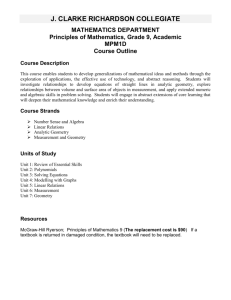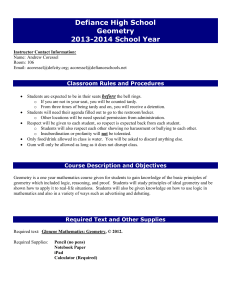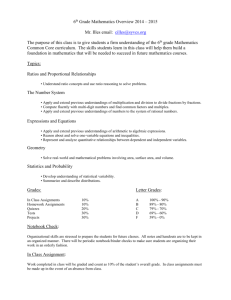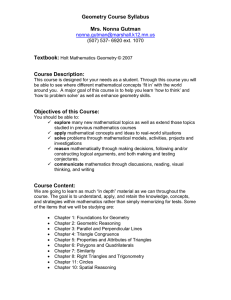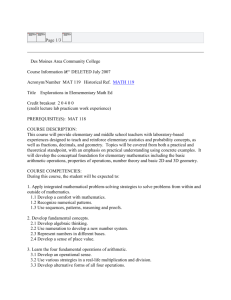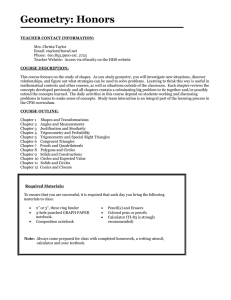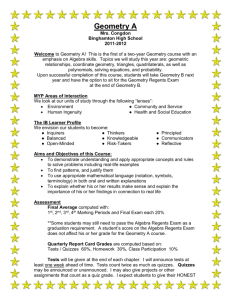MAT 1160 - Math Endeavor
advertisement
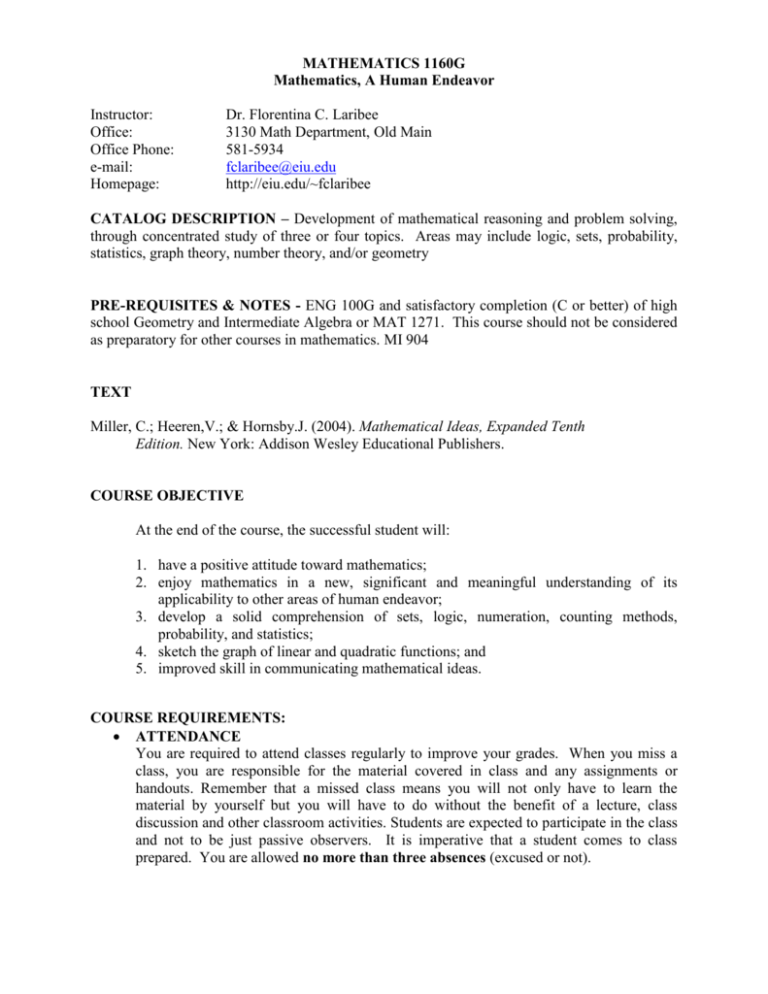
MATHEMATICS 1160G Mathematics, A Human Endeavor Instructor: Office: Office Phone: e-mail: Homepage: Dr. Florentina C. Laribee 3130 Math Department, Old Main 581-5934 fclaribee@eiu.edu http://eiu.edu/~fclaribee CATALOG DESCRIPTION – Development of mathematical reasoning and problem solving, through concentrated study of three or four topics. Areas may include logic, sets, probability, statistics, graph theory, number theory, and/or geometry PRE-REQUISITES & NOTES - ENG 100G and satisfactory completion (C or better) of high school Geometry and Intermediate Algebra or MAT 1271. This course should not be considered as preparatory for other courses in mathematics. MI 904 TEXT Miller, C.; Heeren,V.; & Hornsby.J. (2004). Mathematical Ideas, Expanded Tenth Edition. New York: Addison Wesley Educational Publishers. COURSE OBJECTIVE At the end of the course, the successful student will: 1. have a positive attitude toward mathematics; 2. enjoy mathematics in a new, significant and meaningful understanding of its applicability to other areas of human endeavor; 3. develop a solid comprehension of sets, logic, numeration, counting methods, probability, and statistics; 4. sketch the graph of linear and quadratic functions; and 5. improved skill in communicating mathematical ideas. COURSE REQUIREMENTS: ATTENDANCE You are required to attend classes regularly to improve your grades. When you miss a class, you are responsible for the material covered in class and any assignments or handouts. Remember that a missed class means you will not only have to learn the material by yourself but you will have to do without the benefit of a lecture, class discussion and other classroom activities. Students are expected to participate in the class and not to be just passive observers. It is imperative that a student comes to class prepared. You are allowed no more than three absences (excused or not). QUIZZES, TESTS AND FINAL EXAMINATION There will be frequent unannounced quizzes on materials similar to homework assignments. There is a NO MAKE-UP POLICY in this class for missed quizzes. Each quiz will vary in points ranging from 10 to 25 points. There will be a test at the end of every chapter worth 100 points each. A two-hour final examination worth 200 points will be given on the day and at the time scheduled by the university. If there is a prior agreement with the professor (written or verbal), missed test maybe made-up a day prior to the next scheduled class meeting. Any student who fails to take the test in the prescribed period will be given zero. Early tests/exams including the final will not be given. Do not make any vacation plans that conflict with the final exam. STUDY GROUPS AND TUTORS The formation of a study group inside/outside of class is strongly encouraged. It has been noted in most researches that often the best way to learn a material is to explain it to someone else. The department runs free tutorials, make use of it if warranted. It is the student’s responsibility to seek extra help as needed. Do not wait until you are failing before doing so. EVALUATION 30% 20% 25% 25% quizzes in-class activities chapter tests comprehensive final exam GRADING Your final course grade will be based on the percentage of total points available (in-class activities, quizzes, tests). Letter grades will be assigned as follows: A: 90-100% B: 80-89% C: 70-79% D: 60-69% F: less than 60% CLASSROOM ETIQUETTE Turn off any cell phones before you enter the class. Do not read newspaper/school paper or listen to an MP3 player in class. Come on time. Do not leave early. Do not disrupt the class with loud or excessive talking. Do not eat or drink in class. Always seat properly and do not place your feet on top of the desk. STUDENTS WITH DISABILITIES/OTHER SERVICES Appropriate academic support is available for students with a documented disability. Please notify the professor and contact the Office of Disability Services (581-6583) for further information. Career services – 581-2412; Learning Assistance Center – 581-6696; and Counseling Center – 581-3413. TOPICS TO BE COVERED: Chapter 2 – The Basic Concepts of Set Theory (3 weeks) 2.1 Symbols and Terminology 2.2 Venn Diagrams and Subsets 2.3 Set Operations 2.4 Cardinal Numbers and Surveys Chapter 5 – Number Theory (3 weeks) 5.1 Prime and Composite Numbers 5.2 Selected Topics from Number Theory 5.3 Greatest Common Factor and Least Common Multiple 5.4 Clock Arithmetic and Modular Systems 5.5 The Fibonacci Sequence and Golden Ratio Chapter 14 – Consumer Mathematics (4 weeks) 14.1 The Time Value of Money 14.2 Consumer Credit 14.3 Truth in Lending 14.4 Purchasing a House 14.5 Investing Chapter 9 – Geometry (5 weeks) 9.1 Points, Lines, Planes, and Angles 9.2 Curves, Polygons, and Circles 9.3 Perimeter, Area, and Circumference 9.4 The Geometry of Triangles 9.5 Space Figures, Volume, and Surface Area 9.6 Transformational Geometry
